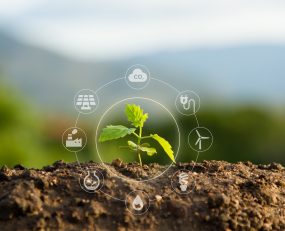
The topic of sustainability is becoming an increasingly important subject in the world of logistics. Some companies have been accused of green-washing (displaying signs of sustainabilty change but the reality is different), but many others are actively investing significant sums to meet the challenge. Here below are some highlights of important investments in sustainability in the global logistics industry over the last few weeks.
Last week, Rhenus Warehousing Solutions (Germany) opened its first sustainable warehouse. The warehouse has achieved BREEAM Excellent certification, demonstrating its commitment to energy efficiency and environmental protection. The building’s energy needs are primarily met by a large solar panel system with a peak output of 9 megawatts, making it one of the largest in Europe.
DHL Global Forwarding reported this month that it has noted an increase in demand for sustainable transport solutions coming from customers, both as part of new tender processes and in discussions with existing customers. The company stated that a growing number of shippers are requesting greater greenhouse gas emissions transparency and are also exploring sustainable solutions, even if they are more costly.
UK parcel delivery company Evri, this month announced its latest roll-out of e-cargo bikes across its national network as part of its commitment to reach net-zero by 2035. Evri, which uses e-cargo bikes in Bristol, Edinburgh and Manchester has partnered with Zoomo, a provider last-mile electric fleet solutions, to provide 15 EAV cargo bikes for its Wimbledon depot.
Also this month, over in the United States, Schneider National announced that it is now operating two Lonestar electric tractor units, further advancing the company’s commitment to lowering carbon emissions and expanding its electric fleet, which is now 94 vehicles. The new tractors will save an estimated 35 tons of CO2 per truck each year.
Two large logistics players announced in August that they have partnered to decarbonise supply chains. DB Schenker and Hapag-Lloyd signed an agreement for emission-reduced container transports with a waste- and residue-based biofuel. By end of 2023, DB Schenker plans to claim approximately 3,000 metric tonnes of carbon dioxide equivalent (CO2e) emissions avoidance. This is based on at least 1,000 tonnes of pure biofuel. Hapag-Lloyd has launched the Ship Green product to offer its customers emission-reduced ocean transports. Based on biofuel, customers of Hapag-Lloyd can add Ship Green as an additional service to their existing bookings.
Here at Transport Intelligence we track the targets and emissions data of leading logistics companies as part of our online information service, GSCi. Supply chain strategists can use GSCi – Ti’s online data platform – to identify opportunities for growth, support strategic decisions, help them stay abreast of industry trends and development, as well as understand future impacts on the industry.
Visit GSCI subscription to sign up today or contact Michael Clover for a free demonstration: [email protected] | +44 (0) 1666 519907
Author: Paul Chapman
Source: Ti Insights